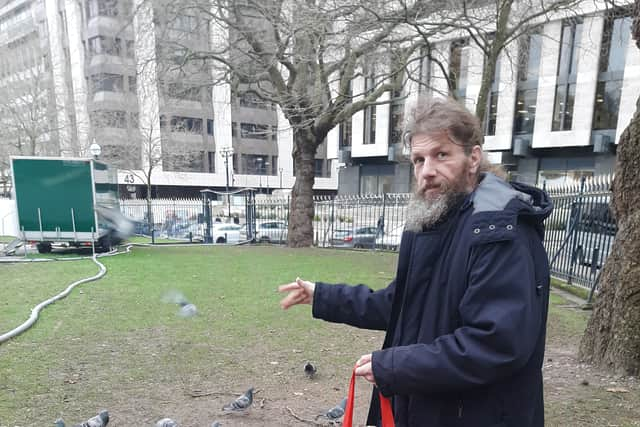We meet Birmingham Bird Man Russell Wilson who tells us why he feeds pigeons in the city centre
and live on Freeview channel 276
A carpet of pigeons has formed around Russell Wilson, the feral birds strutting and jostling for position as he scatters food on the grass of St Philip’s Cathedral grounds in Birmingham city centre.
Each rummage in Russell’s bag, each fling of crumbs brings more birds from the lofty heights of the ancient building to their Good Samaritan’s feet. Soon the turf in Pigeon Park is a seething, undulating, untidy mass of frenzied feathered activity.
Advertisement
Hide AdAdvertisement
Hide AdToday is a good day for Birmingham city centre’s mighty flock that swirl around the cathedral like confetti. Russell has brought shortbread biscuits. The 47-year-old – surviving on sickness benefits – will purchase what his means allow and often his beloved birds make do with breadcrumbs. But he’ll always find something for them.
Russell is Birmingham city centre’s Bird Man, an individual who has taken Mary Poppins’ classic “Feed The Birds” as an order. He is one of many who make a daily pigeon pilgrimage, scattering tit-bits on streets and open spaces.
But opinion is divided over whether they are wildlife heroes or unwitting villains cranking-up a pest control problem. Opinion is also divided over the very birds that have flourished in the heat of a city’s beating heart and dined on its fast food leftovers.
They are messy, spread disease and their droppings erode landmark buildings, say those who dismiss pigeons as merely “flying rats”. Stallholders at the Cathedral Market eyed Russell suspiciously as, like some Pied Piper, he attracted more and more birds to within feet of their pitches.
Advertisement
Hide AdAdvertisement
Hide Ad

“I’ve done this most of my adult life,” said Russell, gazing down at his pets. “It’s very therapeutic. People say they’re a problem in the city centre. I disagree. People who drink too much and take drugs are the problem in the city centre. If pigeons were brightly coloured or had a beautiful song, people would be more open to them. They’re certainly not vermin.”
Katarina Logongi, a visitor from Canada, approached Russell and asked if she could help distribute the crumbs. “Are the birds causing problems for the buildings or are the buildings causing problems for the birds?” she asked in a show of support. Looking on, market worker Michael McKean said: “There are a lot of pigeons and they come very close to the stalls, but I don’t think they do too much harm.”
In Birmingham, it appears the birds have become ornithological Marmite. You either love them or hate them, there is no middle ground. Maurice Hazeldine, from Walsall, said: “The people feeding them don’t know what they’re doing. The disease that their droppings spread is terrible and those feeding them are adding to the problem.”
Workmen Paul Fox also believes Mary Poppins got it wrong. “Shouldn’t feed them,” Paul said, shaking his head as Russell continued to scatter crumbs on the ground. “It’s not the birds, it’s the vermin that are attracted.”
Advertisement
Hide AdAdvertisement
Hide Ad

Are Russell and many others doing the right thing? We’d like your opinion
Birmingham, like any other city, is awash with pigeons and the infestations can be problematic. Some pigeons can carry organisms that can cause salmonellosis, but there’s a health warning attached to most wildlife when forced into close contact with mankind.
The birds have gained enemies by splattering public buildings and the acidic droppings can, overtime, damage stonework. What’s more, when food is readily available, pigeons will breed all year round. That’s why we have so many of them.
The message from Birmingham City Council is clear – ignore Poppins, don’t feed the birds. A local authority advice leaflet states: “The most important factor determining the size of a pigeon population is food and the best long-term solution to the problem of feral pigeons is to restrict its availability. Avoid dropping food waste and litter, clean up spillage areas, keep lids on bins and secure waste bags. Remember - no food, no birds.”
Problem is, residents are divided over whether pigeons are a problem or pleasure.
Comment Guidelines
National World encourages reader discussion on our stories. User feedback, insights and back-and-forth exchanges add a rich layer of context to reporting. Please review our Community Guidelines before commenting.
